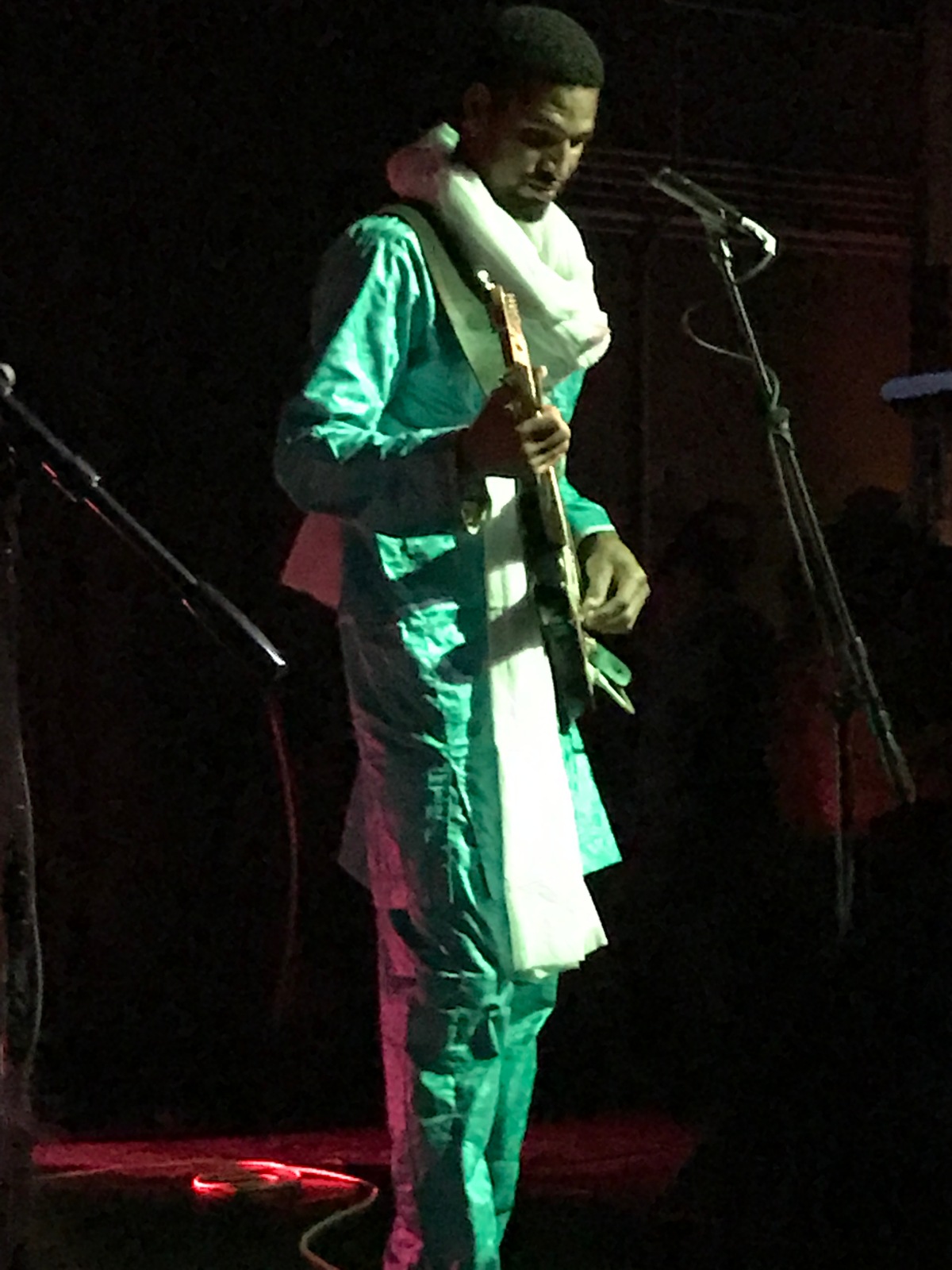Mdou Moctar has a nice little smile. Mona Lisa without the suspicion, though with more guilleless sparkle in the eyes. It’s subtle. But when he flashed it Friday night on stage at the Zebulon Cafe, something like this happened:
And something like this happened in pretty much every song in the set. Guitarist Moctar and his band-mates, rhythm guitarist Ahmoudou Madassane and drummer Mahmoud Ahmed Jabre, would settle into a nice, trance-y west Saharan groove and then, after a steady verse or two, there would be that smile. And…. well, the word that kept coming to mind was frenzy. Everything revved up a gear. Or a dozen gears. Sometimes it would just be the flurry of his spider-leg fingers on his Fender Strat’s fretboard. Sometimes, as in that video, his whole body seemed swept up into making, and receiving, the sounds.
The audience, too, at this packed Frogtown club — mostly young, open to and hungry for a world of sounds — was swept up as well, whipped into the same frenzy, hanging on every note, every beat, every smile, stirred into a collective dancing froth. the word ecstasy might work for this too, but it’s been long-ruined by the rave scene and, well, Ecstasy, the drug. Trance too, for that matter, and bliss, ruined by a kind of new age patina lingering for a few generations. No one was zoning out. No one was transported to another place. This wasn’t about being elsewhere, in mind or body. It was about being right here, right now.
Moctar himself has swept into the position of the latest star to emerge from the culture and music of the Tuareg people, nomads and rebels of the desert region reaching into Niger (where he is from, born in Abalak in the Azawagh desert), Mali, Algeria, Lybia, Nigeria, Burkina Faso and Mauritania. Tuareg music, particularly the electrified brand he plays, remains one of the most prominent, enduring and unlikely phenomena of world music from the last couple of decades, having grown out of the displacement and oppression of these people by various governments, Tuaregs having taken guerrilla action amid great peril and suffering. Tinariwen, the first and still most famous group from the culture, emerged directly from the rebel warfare.
Moctar was already a star at home and well on his way to joining Tinariwen and powerful guitarist Bombino among the handful of Tuaregs with global renown. His new album, “Sousume Tamachek” (from the dedicated Portland-based Sahel Sounds label, which grew from a blog that is essential for all African music fans) captures the magic of his music. But he got an extra boost a few years ago when he starred in the movie “Akounak Tedalat Taha Tazoughai,” basically a Tuareg homage to Prince’s “Purple Rain” with a bit of “The Harder They Come” and the first fictional feature to be made in the Tamashek language. (The title translates as “Rain the Color Blue with a Little Red in it” — Tamashek, it turns out, has no word for purple.) The film, naturally, became something of a world-wide sensation on the culture-shock novelty at first, but ultimately on the heart and dedication that transcends that, not to mention the fantastic Moctar musical performances.
Such terms as Saharan blues and Sahel psychedelia, having been applied to Tuareg music for some time, also seemed ill-fitting beyond any surface application on Friday. The distinction of this music is in its depth. Moctar’s maybe doesn’t bear the explicit sorrows that mark much of Tinariwen’s music, but it’s there at the core, a driving force amid the celebration. This band, and it is really a band, showed remarkable precision and unity even at the most frantic musical moments. Check out this, from an encore instrumental, the three musicians suddenly putting on the brakes, all three at once, and hitting the gas again, with nary a nod. Take a moment to watch Jabre in particular, a drummer of great skill and artistry, seemingly as influenced by jazz as by rock, and driving the music much as Mitch Mitchell did with another lefty Strat player, one Jimi Hendrix, clearly a big influence on Moctar (as is, of course, Hendrix acolyte Prince).
At the end of the first “frenzy” clip at the top of this piece, watch as Moctar makes a simple swipe of his hand across his sweaty forehead, turns to the band and is ready to start again. With a smile at the ready.

I’m now not positive the place you are getting your information, but great topic. I needs to spend a while learning much more or understanding more. Thank you for fantastic information I was on the lookout for this information for my mission.
LikeLike
Magnificent website. Lots of helpful info here. I am sending it to several pals ans additionally sharing in delicious. And naturally, thank you to your effort!
LikeLike